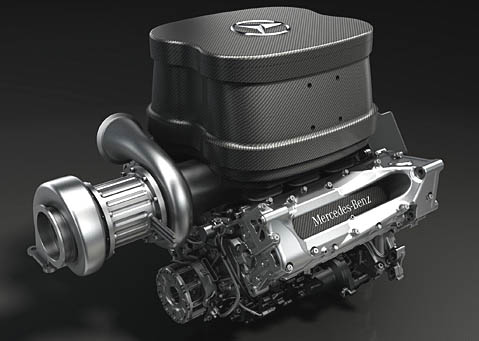


18/02/2013
NEWS STORY
 |
Formula One boss Bernie Ecclestone says that none of Formula One's 11 teams wants to use the new engines which are due to be introduced next year. In 2014 F1's engine specification is due to change from the current 2.4 litre V8s to 1.6 litre turbocharged V6s. It is the most drastic change to the regulations in decades and Ecclestone has voiced fears that the smaller engines could lose the distinctive sound which F1 has become famous for. The new engine specification is fixed in the regulations but as always in F1 uncertainty abounds.
Giving an example of how F1 can be self-destructive, McLaren team principal Martin Whitmarsh recently said "every other weekend we seem to say 'shall we really go V6 or shall we stay with V8s?'" Ecclestone concurs and says "none of the teams want the V6 engine to happen but the manufacturers say that the sound will be good so we will wait and see." His statement may well be hyperbolic but it shows the tension which should not be present one year from implementing the new engines.
The uncertainty over F1's future regulations is exacerbated by the lack of a Concorde Agreement, the contract which governs the sport. The previous Concorde expired at the end of last year and its replacement is thought to be ready for signing. Ecclestone recently met with F1's smaller teams to discuss it and he says that none of the outfits on the grid are at risk of collapsing despite the weak economic climate. He adds that although he thought the Russian team Marussia would pull out this year it has committed to stay.
At the end of 2011 the Spanish HRT outfit shut its doors and since then there has been an influx of pay drivers at many of the remaining teams. Ecclestone's meeting fuelled speculation that the small teams are facing a funding crisis.
He says that the outlook is not as bleak as predicted and, in fact, the point of the meeting was simply to go over the details of the new Concorde.
"I was bringing the teams up to speed with the new Concorde Agreement. They are all safe. We have got a deal with them all including Marussia. We are continuing with Marussia. I thought they were going to go but they are not."
Marussia's sporting director Graeme Lowdon says that although the team has not actually got a final agreement, it is on its way. "We are in discussions with the commercial rights holder and we certainly expect to conclude something. This is not adversarial," he says.
Marussia's latest financial statements are for the year-ending 31 December 2011 and show that the team made a net loss of £49.3m. In September last year its chief executive Andy Webb said that "the directors are in active discussions with potential new investors in the business and are also pursuing other sources of income including potential sponsorship and drivers." Since then, it has not made an announcement about new investment and the team lost out on around £19m in prize money as it finished eleventh in the standings, one place down from the place it had occupied for most of the latter part of the season. It has a far brighter outlook.
The teams will get a big boost from the new Concorde. "They've all got more money than God," quips Ecclestone.
Under the previous contract the top ten teams shared 47.5% of F1's profits with Ferrari getting an additional 2.5% to itself and those outside the top ten getting £6.5m ($10m) each. It gave the teams a total of £450.9m ($698.5m) in 2011 but this is expected to rise by over £96.8m ($150m) this year as the new Concorde will give them a total of 63% of F1's profits.
Ecclestone recently said that he doesn't actually need the Concorde in place since he has got legally binding commercial agreements which commit the teams to race until the end of 2020. However, the teams want a new Concorde as it gives them visibility over F1's technical regulations.
There is good reason why he has had separate meetings with the leading teams and those lower down the grid. The commercial agreements and the new Concorde refer to what are known as Constructors' Championship Bonus (CCB) teams which are the top three based primarily on races won in the four seasons prior to 2012. They get significant financial benefits and control over F1 reflecting their success in the sport.
From this year the CCB teams will share in a dedicated prize fund comprising the greater of 7.5% of F1's profits and £64.5m ($100m). Consent of a majority of the CCB teams is also required if there are more than 20 races in a season or more than 17 with over 60% held outside Europe, the US or Canada. Given the influence that these teams have it is understandable that Ecclestone has been negotiating with them separately and it is likely to carry on that way.